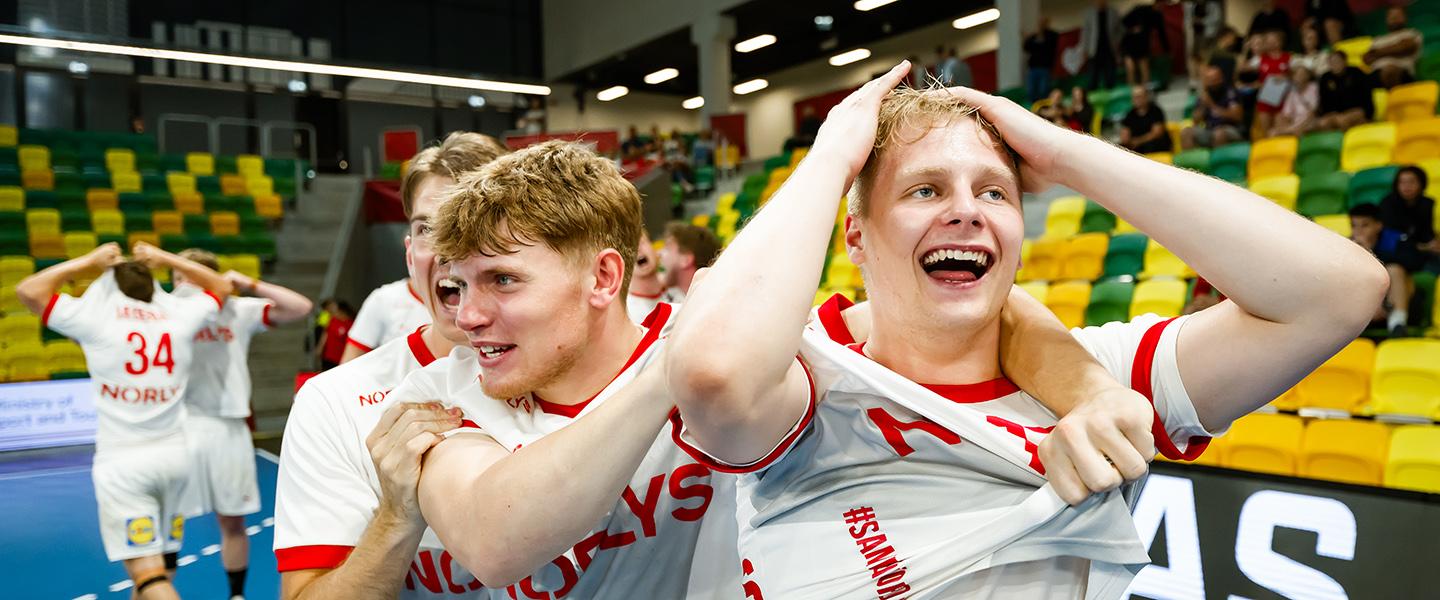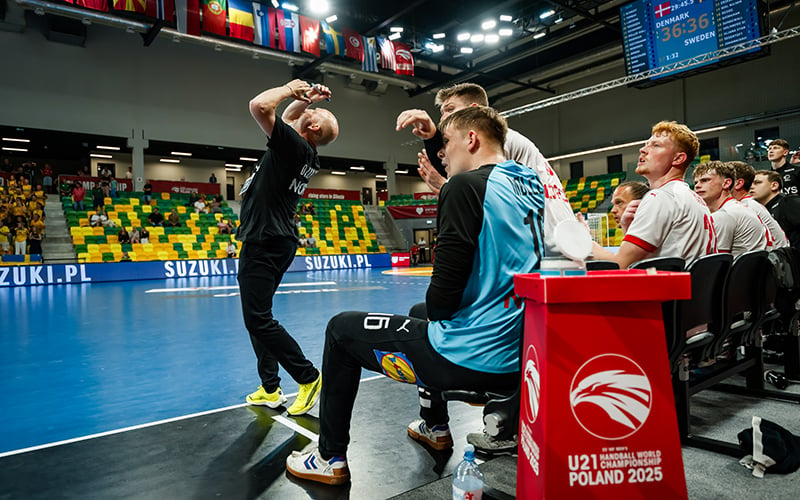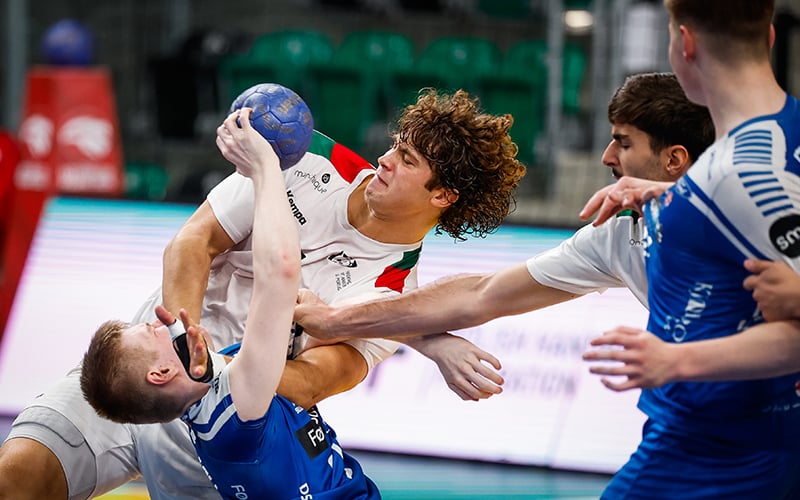An epic summer evening delivers the two finalists at Poland 2025
28 Jun. 2025

To put in perspective just how mindboggling was Friday’s evening at the 2025 IHF Men’s Junior World Championship, there is only one statistic which should be mentioned. Never in the history of the competition – in all previous 24 editions – have the two semi-finals went to overtime.
Sure, there were final berths decided after the regular 60 minutes, but never in such a dramatic way, with both qualified teams needing to overcome such a hefty challenge in order to play for the title.
With both matches throwing off at the same time, 21:00 CEST, in Sosnowiec and Katowice, every attack, every pass, every foul mattered. Denmark needed 70 minutes to clinch a 40:37 win against Sweden. Portugal had to endure 10 minutes more against the Faroe Islands and just secure a place in the final by the skin of their teeth, after goalkeeper Diego Rema Marques saved a penalty after the buzzer to propel Portugal to the final.
If the Faroe Islands scored that crucial penalty through line player Isak Vedelsboel, the second finalist would have been decided on penalties.
Drama, epic moments, an evening which should not be forgotten. But how did everything unfold in Katowice and Sosnowiec?

As the two matches threw off, it looked increasingly clear they were both going to be close ones. And by the 20th minute, when Sweden had a four-goal lead in Katowice, 13:9 against Denmark, Portugal led by two goals against the Faroe Islands, 9:7. Fast-forward 10 minutes and Portugal had a three-goal lead, 15:12, while Sweden were up by one goal, 19:18, after conceding a buzzer-beater goal against Denmark.
“We knew we were going to have a tough match against Sweden, we knew how they played, so we were really prepared for a long match and a close one,” said Denmark’s coach, Ulrik Kirkely, at the end of the semi-final against Sweden.
What Denmark probably were not prepared for – or at least they thought they can avoid – is boasting a three-goal lead and fail to protect it. The Scandinavian side came back roaring, first built a two-goal lead, which finally turned into a three-goal one, 30:27, with 15 minutes to go.
18 kilometres away, in Sosnowiec, the Faroe Islands were onto their own comeback, and had a two-goal lead, 24:22, with 13 minutes to go. Therefore, it was clear that this was going to be a long night, at the end of an action-packed day, with six matches played in each of the two venues.
And because this was an epic night, we got not one, but two overtime semi-finals, for the first time in the history of the competition. In Katowice, Sweden came back, tied the score in the final minutes, 36:36, to push the match into extra-time. And in Sosnowiec, it was Portugal which wrestled back the lead, 28:27, with four minutes to go, only for the Faroese to score through Oli Mittun and Niklas Gaard, to push the match into overtime, 29:29.

“We ended up not having the 'star', we didn't play a fantastic game. In terms of tactics and technique, it wasn't our best game, but once again this team showed a great fighting spirit. Great mutual support, great unity. And that was decisive,” said Portugal’s coach, Carlos Martingo.
Twists and turns, highs and lows, drama on each attack. The Hollywood script was there for everybody to see, with the sets of fans watching incredulously what was unveiling before their eyes. And others were there with their eyes in the screens of their devices, checking constantly what was unfolding in the other arena.
After 72 goals scored in the first 60 minutes, the tempo in the Scandinavian derby slowed down. A single goal was scored in the first half of the overtime, and it came for Denmark. Their superior depth and experience paid off and in the end, Denmark made it to the final, with a 40:37 overtime win.
Sweden had run out of steam, scoring a single goal in 10 minutes, after putting 36 past Denmark in the first 60.
“Of course, it is a magnificent feeling, but a match was very hard. A very, very hard match against a worthy opponent,” said Kirkely.
But in Sosnowiec, it was far from over. As the dust settled and the fans were slowly moving out of the arena in Katowice, their phones showed the dramatic scenes from the match between Portugal and the Faroe Islands.
First, Portugal could have closed it in the first overtime, when they led by two goals, with 57 seconds to go. Isak Vedelsboel and Rókur Ziskason made sure that Faroe were back in the match, tying the score, 34:34.
Then Portugal had a two-goal lead in the 78th minute, Faroe cut it to a single goal and in the final seconds of the match, won a penalty. Vedelsboel, who had six goals in the competition and converted 13 out of 18 penalties before the last one took the shot, but Portugal’s goalkeeper, Diogo Rema Marques, saved it at the buzzer.
38:37 for Portugal, which made it for the first time in history in the final of the IHF Men’s Junior World Championship.
“I think that despite the draw, whether in the first or second extra time… we could have finished the game at every opportunity. Either in regular time or at the end of the first extra time, and we ended up doing it in the last breath of the second extra time,” said Martingo after the match.
For almost two hours, it was impossible to decide which teams are going to feature in the final at Poland 2025. The answer is here and it really makes for another David vs Goliath meeting: Denmark, the team that have the largest number of finals appearances, 10, versus Portugal, who have won a single medal so far, a bronze in 1995.
It's game on!

